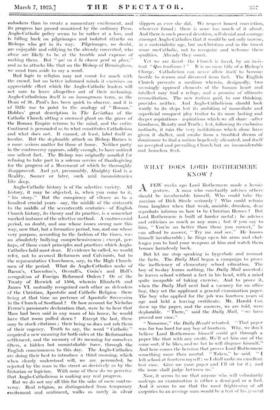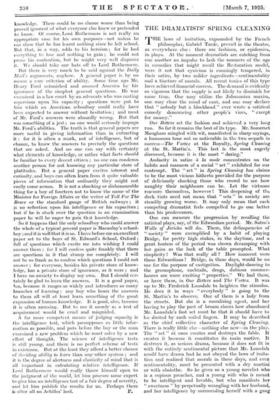A FEW weeks ago Lord Rothermere made a heroic gesture. A
man who constantly advises others should be invulnerable himself. Who could take the maxims of Dick Steele seriously ? Who could refrain from laughter when that weak, amiable, drunken, dear reprobate informs us how tg be Christian Heroes ? But Lord Rotherinere is built Of harder metal ; he advises and criticizes as much as any man ; but if you say to him, " You're no better than those you correct," he can afford to answer, " Try me and see." He knows himself invulnerable ; he flings open his arms and chal- lenges you to hurl your weapons at him and watch them bounce harmlessly back.
But let me stop speaking in hyperbole and recount the facts. . The Daily Mail began a campaign to prove the inefficiency of elementary school education. The boy of to-day learns nothing, the Daily Mail asserted ; he leaves school without a fact in his head, with a mind quite incapable of taking exercise. And to prove it, when the Daily Mail next had a vacancy for an ollice boy, they set the applicant a general examination paper. The boy who applied for the job was fourteen years of age and held a leaving certificate. Mr. Harold Cox drew up the paper, and the answers, we are told, were deplorable. " There," said the Daily Mail, " we have proved our case."
"Nonsense," the Daily Herald retorted. "That paper was far too hard for any boy of fourteen. Why, we don't believe Lord Rothermere himself could get through a paper like that with any credit. We'll set him one of the same sort, if he likes, and we bet he will disgrace himself." And here comes the heroism that proves Lord Rothermere something more than mortal. " Taken," he said. " I left school at fourteen myself ; so I shall make an excellent test case. Give me your paper and I'll sit for it ; and the issue shall judge between us."
Now, it seems to me that anyone who will voluntarily undergo an examination is either a demi-god or a fool. And it seems to me that the most frightening of all enquiries to an average man would be a test of his general knowledge. There could be no shame worse than being proved ignorant of what everyone else knew or pretended to know. Of course; Lord Rothermere is not really an. appropriate case for his own purposes—not unless he can show that he has learnt nothing since he left school. But that, in a way, adds to his heroism ; for he had everything to lose and nothing to gain ; he could not prove his contention, but he might very well disprove it. We should take our hats off to Lord Rothermere.
But there is very much to be said against the Daily Mail's arguments, anyhow. A general paper is by no means a sure criterion of ability. Some time ago Mr. henry Ford astonished and amused America by his ignorance of the simplest general questions. He was examined in a law court by an advocate who was casting aspersions upon his capacity ; questions were put to him which an American schoolboy could really have been expected to answer without hesitation ; and most of Mr. Ford's answers were absurdly wrong. Bid that was something of a jest ; no one would seriously impugn Mr. Ford's abilities. The. truth is that general papers are more useful. in giving information than in extracting it : for it is often a mark, not of intelligence, but of chance, to know the answers to precisely the questions that are asked. And no one can say with certainty what elements of knowledge, or rather what facts should be familiar to every decent citizen ; no one can condemn another person. for . not knowing any particular store of platitudes. But a general paper excites interest and curiosity, and boys can often learn from it quite valuable pieces of information that ordinarily they might not easily come across. It is not a shocking or dishonourable thing for a boy of fourteen not to know the name ,of the Minister for Foreign. Affairs or the writer of Toll For. The: Brave • or the standard gauge . of British . railways ;. it is no reflection upon. his. intelligence or his capacities ; but if heis • stuck over the question in an examination paper he • will be eager • to gain tint knowledge.
So it happens that the only schoolboy who could answer the whole of a typical general paper is Macaulay's school, boy ; and it is well that it is so. I have before me an excellent paper set to the boys of St. Edward's School,. Oxford full of questions which excite me into wishing. I could answer them ; for I will confess quite frankly. that there are questions in it : that stump me completely. I will not be so frank as to confess which questions I could. not answer ; for everyone, besides his private store of know- ledge, has a private store of ignorance, as it were ; and I have no anxiety to display my own. But I should cer- tainly: be glad to learn the answers. It is a good paper, too, because it ranges so widely and introduces so many branches of learning : any boy who hears the answers to them all. will at least learn something of the great expansion of human knowledge. It is good, also, because it is often amusing. But to use it merely as a test of acquirement would .be cruel and misguided.
A far more competent means of judging capacity is the intelligence test, which presupposes as little infor- mation as possible, and puts before the boy or the man examined a new problem which he must solve by a new effort of thought. The science of intelligence tests is still young, and there is no perfect scheme of tests in existence. But at the least they afford a better chance of deciding ability to learn than any 'other system ; and it is the degree of alertness and elasticity of mind that is all important in calculating relative intelligence. If Lord Rothermere would really throw himself open to the judgment of the world, let him procure some expert to give him an intelligence test of a fair degree of severity, and let him publish the results for us. Perhaps there is after all an Achilles' heel. P.



























































 Previous page
Previous page